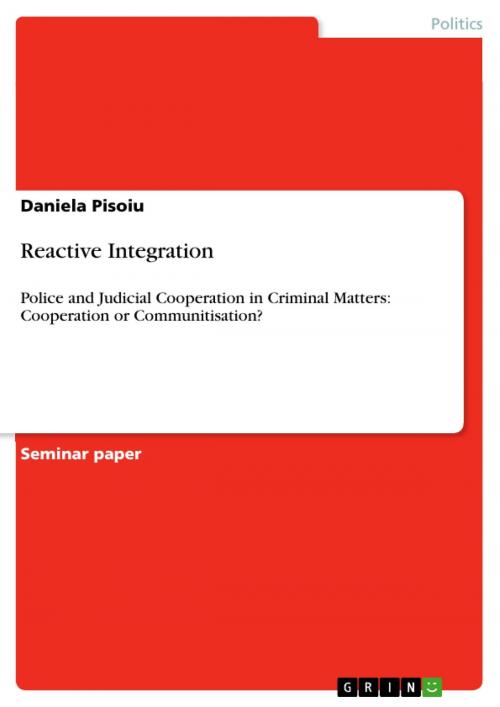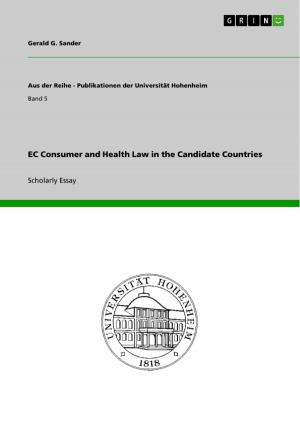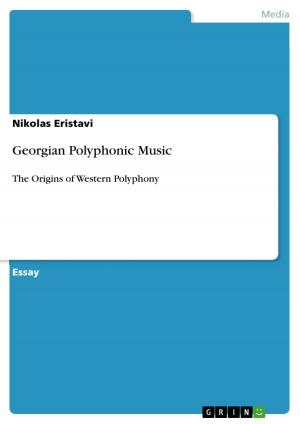Reactive Integration
Police and Judicial Cooperation in Criminal Matters: Cooperation or Communitisation?
Nonfiction, Social & Cultural Studies, Political Science| Author: | Daniela Pisoiu | ISBN: | 9783640288984 |
| Publisher: | GRIN Publishing | Publication: | March 13, 2009 |
| Imprint: | GRIN Publishing | Language: | English |
| Author: | Daniela Pisoiu |
| ISBN: | 9783640288984 |
| Publisher: | GRIN Publishing |
| Publication: | March 13, 2009 |
| Imprint: | GRIN Publishing |
| Language: | English |
Seminar paper from the year 2005 in the subject Politics - International Politics - Topic: European Union, grade: 1,5, Diplomatic Academy of Vienna - School of International Studies, course: Intensive Seminar 'The EU as a Global Actor', 47 entries in the bibliography, language: English, abstract: European competences do not exist and develop for the sake of the European Union; the European Union exists and develops in spite of the states, as a solution of their failures, as they are forced to accept that the Union level can offer better solutions in a particular field than the national level. Cooperation in Police and Criminal Law Matters, the 3rd pillar of the Union, is still subject to intergovernmental cooperation among the Member States. The terrorist attacks in the USA and in Spain had undoubtedly a strong impact on this area, leading to a visible intensification of inter-state cooperation. This consequence is only natural, since terrorism is a crime, therefore a matter for police and judicial cooperation in criminal matters; terrorism is a global issue, affecting multiple states and therefore its combating needs the cooperation among states. Unlike on the international stage, in European Union's case more than intensified cooperation could be possible, by way of transferring 3rd pillar matters to the supranational level of the 1st pillar. This paper is putting forward an assessment on the likelihood of this process taking place, within the following structure: a brief overview of the way anti-terrorism measures affected the 3rd pillar, followed by an assessment of intergovernmental cooperation and communitisation as likely and recommendable for the cooperation in police and criminal matters. Finally, the 'case-study' of the Framework Decision regarding the definition of terrorist offences will serve as exemplification of the arguments brought in the previous chapter.
Seminar paper from the year 2005 in the subject Politics - International Politics - Topic: European Union, grade: 1,5, Diplomatic Academy of Vienna - School of International Studies, course: Intensive Seminar 'The EU as a Global Actor', 47 entries in the bibliography, language: English, abstract: European competences do not exist and develop for the sake of the European Union; the European Union exists and develops in spite of the states, as a solution of their failures, as they are forced to accept that the Union level can offer better solutions in a particular field than the national level. Cooperation in Police and Criminal Law Matters, the 3rd pillar of the Union, is still subject to intergovernmental cooperation among the Member States. The terrorist attacks in the USA and in Spain had undoubtedly a strong impact on this area, leading to a visible intensification of inter-state cooperation. This consequence is only natural, since terrorism is a crime, therefore a matter for police and judicial cooperation in criminal matters; terrorism is a global issue, affecting multiple states and therefore its combating needs the cooperation among states. Unlike on the international stage, in European Union's case more than intensified cooperation could be possible, by way of transferring 3rd pillar matters to the supranational level of the 1st pillar. This paper is putting forward an assessment on the likelihood of this process taking place, within the following structure: a brief overview of the way anti-terrorism measures affected the 3rd pillar, followed by an assessment of intergovernmental cooperation and communitisation as likely and recommendable for the cooperation in police and criminal matters. Finally, the 'case-study' of the Framework Decision regarding the definition of terrorist offences will serve as exemplification of the arguments brought in the previous chapter.















